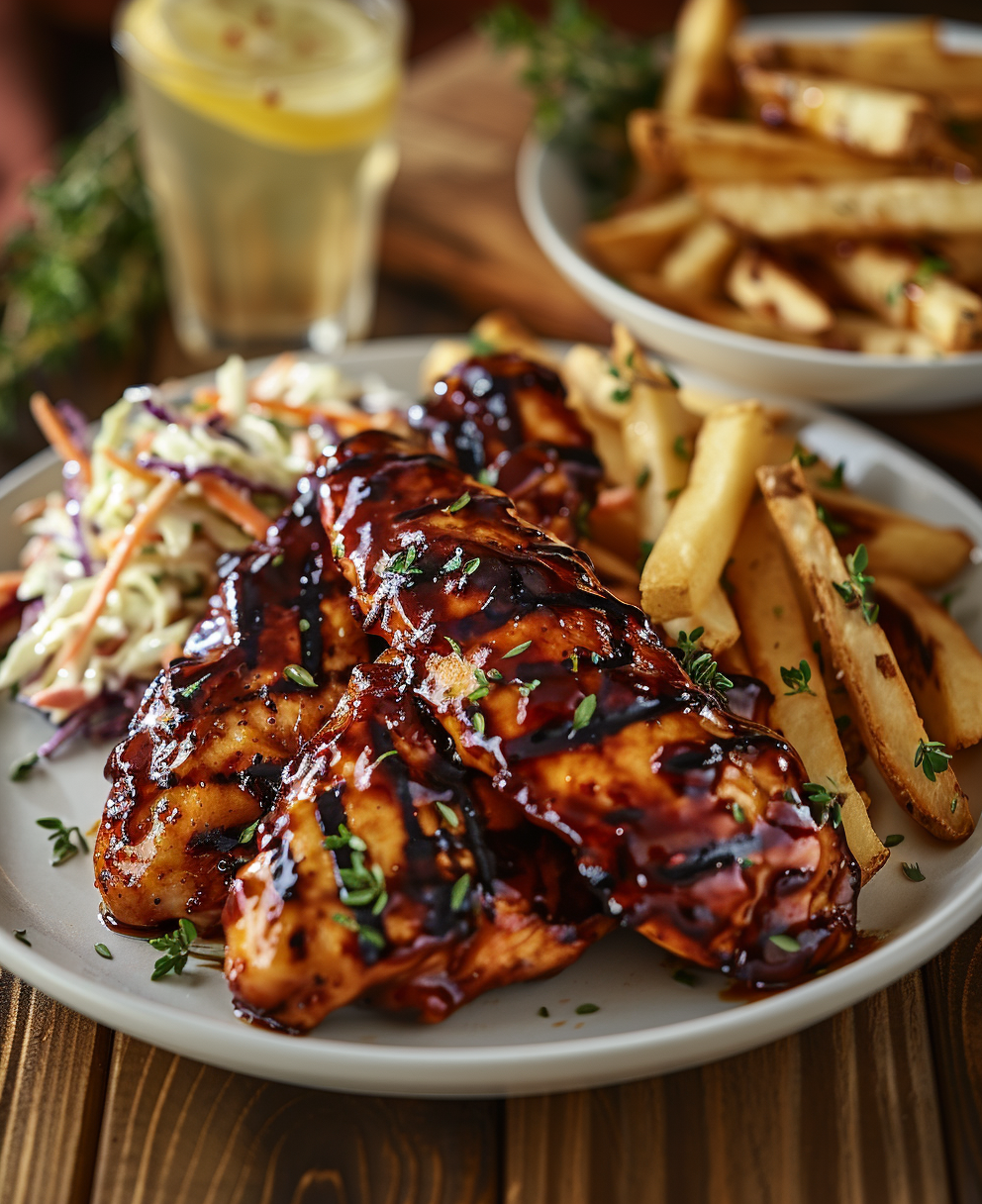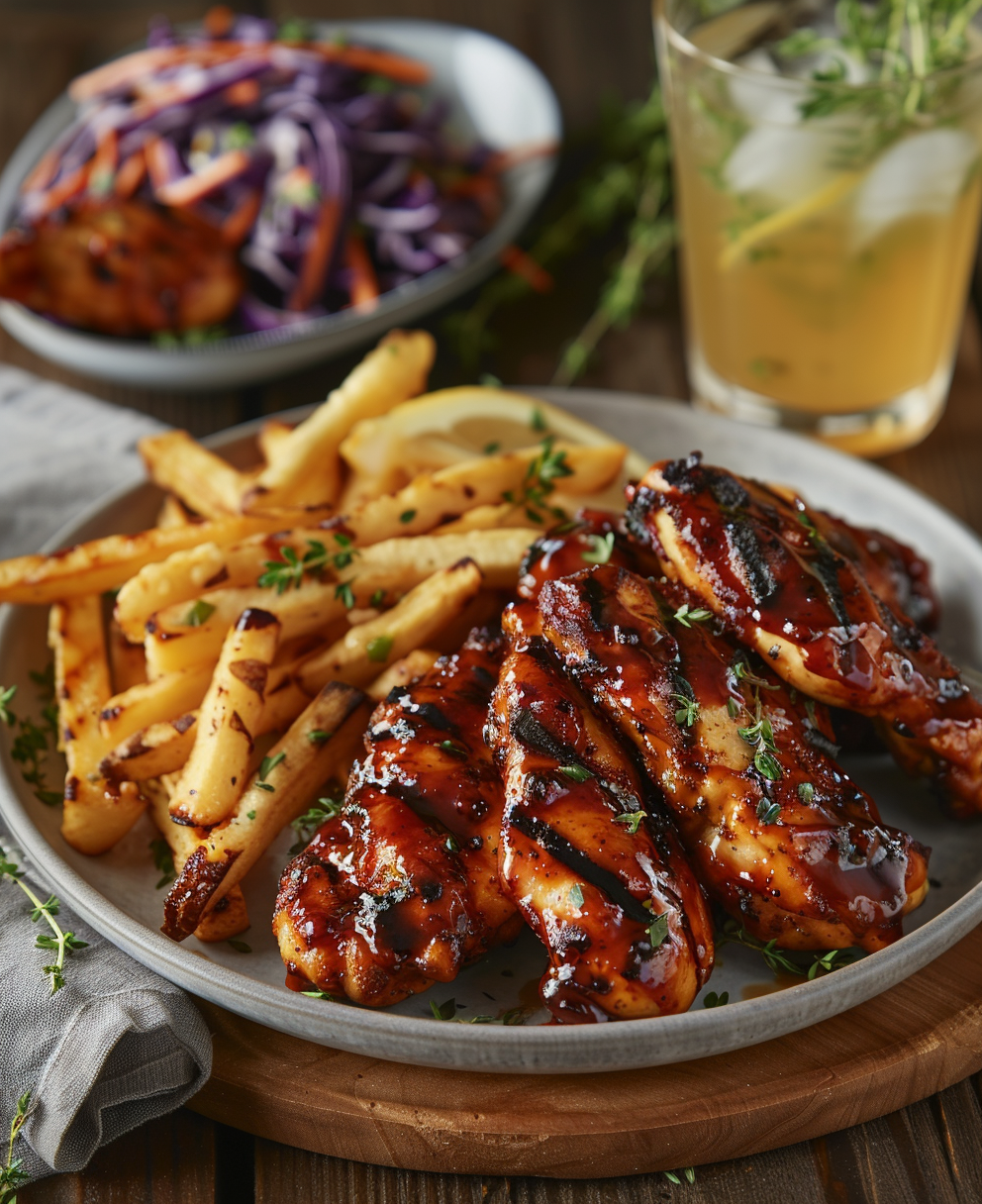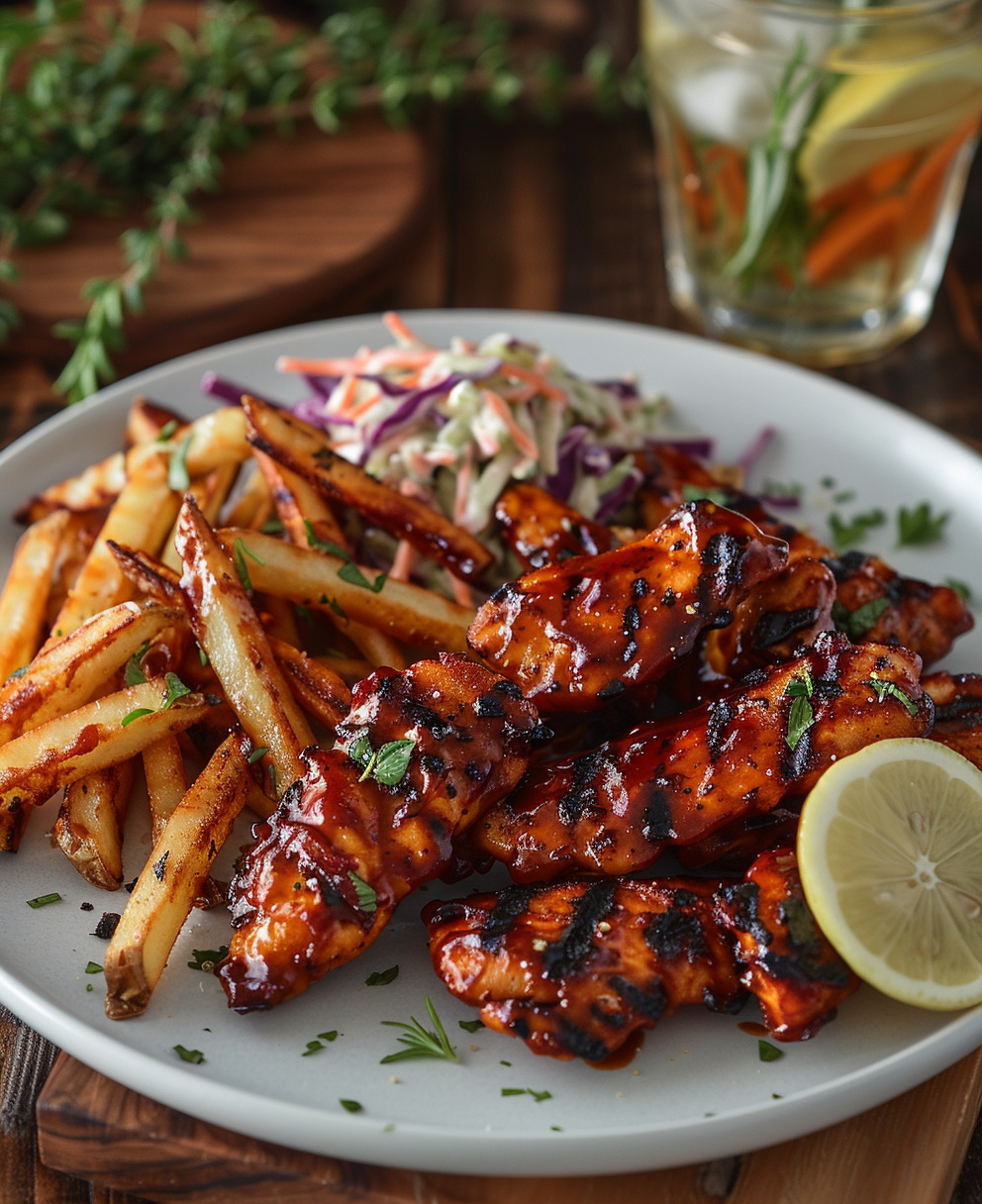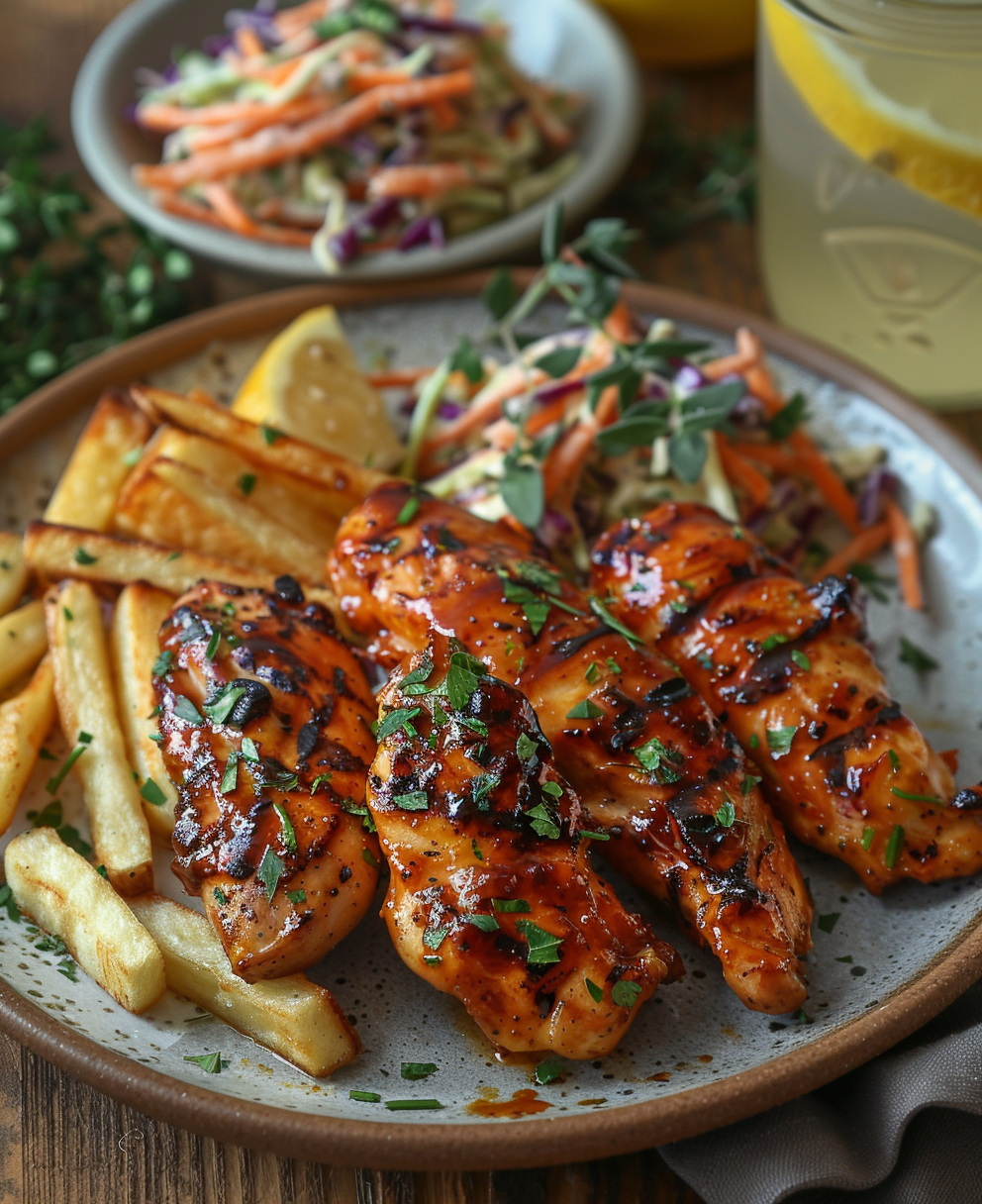Barbecue Chicken Tenders: A Crowd-Pleasing Favorite
Let me tell you a little story. One summer evening, I decided to try something new for my family’s weekend dinner. I wanted something easy, flavorful, and fun—something that would make everyone smile. That’s when I stumbled upon the magic of barbecue chicken tenders. These juicy, smoky, saucy bites of heaven turned out to be such a hit that my kids begged me to make them again the very next day. Now, it’s become a staple in our home, and today, I’m sharing this simple yet sensational recipe with you.
A Little Background on Barbecue Chicken Tenders
Chicken tenders have been a favorite snack or meal option for decades, but adding barbecue sauce takes them to a whole new level. The combination of tender chicken, smoky grill flavors, and sweet-tangy barbecue sauce is irresistible. While traditional fried chicken tenders are great, grilling them gives them a unique depth of flavor. Plus, they’re perfect for casual get-togethers or weeknight dinners. Over the years, I’ve experimented with different marinades, sauces, and techniques to create what I think is the ultimate version of barbecue chicken tenders.
Why You’ll Love This Recipe
This recipe is all about simplicity and bold flavors. The chicken stays juicy and tender, thanks to a quick marinade, while the barbecue sauce caramelizes beautifully on the grill. It’s a dish that even beginner cooks can master. Plus, it’s versatile—you can adjust the heat, sweetness, or tanginess of the sauce to suit your taste. Whether you’re feeding picky eaters or impressing guests, these tenders are sure to please.
Perfect Occasions for Barbecue Chicken Tenders
These barbecue chicken tenders are perfect for game nights, backyard barbecues, or even a quick weeknight meal. They’re also a hit at potlucks because they’re easy to share and can be served with a variety of sides like coleslaw, corn on the cob, or potato salad. If you’re hosting a kid-friendly gathering, this dish will disappear faster than you can say “grill marks.”
Ingredients
- 1 pound chicken tenders
- 1/4 cup olive oil
- 2 tablespoons soy sauce
- 2 cloves garlic, minced
- 1 teaspoon smoked paprika
- 1/2 teaspoon black pepper
- 1 cup barbecue sauce (store-bought or homemade)
- 1 tablespoon honey (optional, for extra sweetness)
Substitution Options
- Use chicken breasts cut into strips if you can’t find tenders.
- Swap olive oil with melted butter for a richer flavor.
- Replace soy sauce with tamari for a gluten-free option.
- If you don’t have smoked paprika, use regular paprika with a dash of liquid smoke.
Preparation Section
Step 1: Marinate the Chicken
In a large bowl, whisk together olive oil, soy sauce, minced garlic, smoked paprika, and black pepper. Add the chicken tenders and toss until they’re evenly coated. Cover the bowl with plastic wrap and let it sit in the fridge for at least 30 minutes. Pro tip: Marinating longer (up to 4 hours) makes the chicken even more flavorful. Should I marinate chicken tenders before grilling? Absolutely! It keeps them juicy and infuses them with flavor.
Step 2: Preheat the Grill
While the chicken marinates, preheat your grill to medium-high heat. Make sure the grates are clean and lightly oiled to prevent sticking. Pro tip: If you don’t have a grill, a grill pan or even an air fryer works well too. How long do you barbecue chicken tenders? About 3-4 minutes per side, depending on thickness.
Step 3: Grill the Chicken
Place the chicken tenders on the hot grill and cook for 3-4 minutes per side, or until they reach an internal temperature of 165°F. Watch for those beautiful grill marks—they add both flavor and visual appeal. Pro tip: Keep the lid closed as much as possible to maintain even heat.
Step 4: Add the Sauce
During the last minute of grilling, brush the chicken tenders generously with barbecue sauce. Flip them once and brush the other side. Do you put barbecue sauce on chicken before cooking? Not usually—it’s better to add it toward the end so the sugars don’t burn. Let the sauce caramelize slightly before removing the chicken from the grill.
Step 5: Rest and Serve
Transfer the barbecue chicken tenders to a plate and let them rest for 5 minutes. This allows the juices to redistribute, keeping the chicken moist and tender. Serve with extra barbecue sauce on the side for dipping. Chef’s tip: Sprinkle a pinch of flaky sea salt over the tenders just before serving for an extra burst of flavor.
Timing
- Prep time: 10 minutes
- Marinating time: 30 minutes to 4 hours
- Cooking time: 8-10 minutes
- Total time: 50 minutes (minimum)
Chef’s Secret
To keep chicken tenders from getting tough, avoid overcooking them. Use a meat thermometer to check for doneness at 165°F. Overcooked chicken becomes dry and chewy, which no one wants.
Extra Info
Did you know that chicken tenders are actually a specific muscle from the underside of the chicken breast? They’re naturally tender and quick-cooking, making them ideal for recipes like this one. Fun fact: Kids love them because they’re bite-sized and easy to eat!
Necessary Equipment
- Grill or grill pan
- Tongs
- Meat thermometer
- Basting brush
- Mixing bowls
Storage
If you have leftovers, store them in an airtight container in the fridge for up to 3 days. Reheat them gently in the oven or microwave to avoid drying them out. For longer storage, freeze the cooked tenders in a single layer on a baking sheet, then transfer them to a freezer bag. They’ll keep for up to 3 months.
When reheating frozen tenders, thaw them overnight in the fridge first. This ensures even heating without turning the chicken rubbery. To reheat, place them on a baking sheet and warm them in a 350°F oven for 10-15 minutes.
Never refreeze cooked chicken tenders after thawing them. This can compromise the texture and safety of the dish.
Tips and Advice
- Pat the chicken dry with paper towels before marinating to help the seasoning stick better.
- Use a high-quality barbecue sauce for the best results.
- If you want spicier tenders, add a dash of hot sauce to the marinade.
Presentation Tips
- Serve the tenders on a wooden board with garnishes like fresh parsley or sliced lemons.
- Arrange them in a basket lined with parchment paper for a casual vibe.
- Create a dipping station with multiple sauces like ranch, honey mustard, or buffalo.
Healthier Alternative Recipes
Looking for ways to lighten up this dish? Here are six variations:
- Baked Version: Skip the grill and bake the tenders at 400°F for 20 minutes, flipping halfway through.
- Air Fryer Method: Cook at 375°F for 10-12 minutes, shaking the basket halfway through.
- Low-Sugar Sauce: Use a sugar-free barbecue sauce to reduce calories.
- Gluten-Free Option: Swap soy sauce with tamari and ensure your barbecue sauce is gluten-free.
- Vegan Twist: Substitute chicken with tofu or tempeh and follow the same steps.
- Spice Rub Only: Skip the sauce and use a dry rub of spices for a healthier twist.
Common Mistakes to Avoid
Mistake 1: Overcooking the Chicken
Overcooked chicken tenders turn dry and tough. Always use a meat thermometer to check for doneness at 165°F. Practical tip: Remove the chicken from the grill just before it hits 165°F, as it will continue cooking from residual heat.
Mistake 2: Skipping the Marinade
Marinating adds flavor and moisture. Without it, the chicken can taste bland. Even a quick 30-minute marinade makes a big difference.
Mistake 3: Adding Sauce Too Early
Barbecue sauce contains sugar, which burns easily. Brush it on during the last few minutes of cooking to avoid charred, bitter flavors.
FAQ
How long do you barbecue chicken tenders?
Barbecue chicken tenders typically take 3-4 minutes per side on a medium-high grill. The key is to cook them until they reach an internal temperature of 165°F. Avoid guessing—use a meat thermometer to ensure they’re perfectly done.
How do you keep chicken tenders from getting tough?
To keep chicken tenders tender, don’t overcook them. Aim for an internal temperature of 165°F and remove them from the heat immediately. Also, marinating beforehand helps retain moisture.
Do you put barbecue sauce on chicken before cooking?
No, it’s best to add barbecue sauce toward the end of cooking. Adding it too early can cause the sugars to burn, resulting in a bitter taste.
Should I marinate chicken tenders before grilling?
Yes! Marinating adds flavor and keeps the chicken juicy. Even a short 30-minute marinade makes a noticeable difference.
Can I use bottled barbecue sauce?
Absolutely! Store-bought barbecue sauce works great, but choose a high-quality brand for the best flavor.
What sides pair well with barbecue chicken tenders?
Try coleslaw, corn on the cob, baked beans, or potato salad. These sides complement the smoky-sweet flavors of the tenders.
Can I freeze cooked chicken tenders?
Yes, freeze them in a single layer on a baking sheet, then transfer to a freezer bag. They’ll keep for up to 3 months.
How do I reheat leftover tenders?
Reheat them gently in the oven at 350°F for 10-15 minutes to prevent drying them out.
What if I don’t have a grill?
No problem! Use a grill pan, stovetop skillet, or air fryer to achieve similar results.
Can I make this recipe gluten-free?
Yes, simply swap soy sauce with tamari and ensure your barbecue sauce is gluten-free.
A Final Word on Barbecue Chicken Tenders
There you have it—a simple, delicious recipe for barbecue chicken tenders that’s sure to become a family favorite. Whether you’re grilling for a crowd or whipping up a quick dinner, these tenders deliver bold flavors and juicy goodness every time. So fire up the grill, grab your favorite barbecue sauce, and get ready to enjoy a meal that’s as fun to make as it is to eat. Happy grilling!

Barbecue Chicken Tenders
Ingredients
Equipment
Method
- In a large bowl, whisk together olive oil, soy sauce, minced garlic, smoked paprika, and black pepper.
- Add the chicken tenders and toss until they’re evenly coated.
- Cover the bowl with plastic wrap and let it sit in the fridge for at least 30 minutes (up to 4 hours for more flavor).
- Preheat your grill to medium-high heat, ensuring the grates are clean and lightly oiled.
- Place the chicken tenders on the hot grill and cook for 3-4 minutes per side, or until they reach an internal temperature of 165°F.
- During the last minute of grilling, brush the chicken tenders generously with barbecue sauce on both sides.
- Let the sauce caramelize slightly before removing the chicken from the grill.
- Transfer the barbecue chicken tenders to a plate and let them rest for 5 minutes before serving.
- Serve with extra barbecue sauce on the side for dipping.



